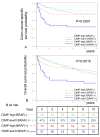CpG island methylator phenotype, microsatellite instability, BRAF mutation and clinical outcome in colon cancer
- PMID: 18832519
- PMCID: PMC2679586
- DOI: 10.1136/gut.2008.155473
CpG island methylator phenotype, microsatellite instability, BRAF mutation and clinical outcome in colon cancer
Abstract
Background: The CpG island methylator phenotype (CIMP), characterised by widespread promoter methylation, is associated with microsatellite instability (MSI) and BRAF mutation in colorectal cancer. The independent effect of CIMP, MSI and BRAF mutation on prognosis remains uncertain.
Methods: Utilising 649 colon cancers (stage I-IV) in two independent cohort studies, we quantified DNA methylation in eight CIMP-specific promoters (CACNA1G, CDKN2A (p16), CRABP1, IGF2, MLH1, NEUROG1, RUNX3 and SOCS1) as well as CHFR, HIC1, IGFBP3, MGMT, MINT1, MINT31, p14, and WRN by using MethyLight technology. We examined MSI, KRAS and BRAF status. Cox proportional hazard models computed hazard ratios (HRs) for colon cancer-specific and overall mortalities, adjusting for patient characteristics and tumoral molecular features.
Results: After adjustment for other predictors of patient survival, patients with CIMP-high cancers (126 (19%) tumours with >or=6/8 methylated CIMP-specific promoters) experienced a significantly low colon cancer-specific mortality (multivariate HR 0.44, 95% confidence interval (CI) 0.22 to 0.88), whereas the BRAF mutation was significantly associated with a high cancer-specific mortality (multivariate HR 1.97, 95% CI 1.13 to 3.42). A trend toward a low cancer-specific mortality was observed for MSI-high tumours (multivariate HR 0.70, 95% CI 0.36 to 1.37). In stratified analyses, CIMP-high tumours were associated with a significant reduction in colon cancer-specific mortality, regardless of both MSI and BRAF status. The relation between CIMP-high and lower mortality appeared to be consistent across all stages. KRAS mutation was unrelated to prognostic significance.
Conclusion: CIMP-high appears to be an independent predictor of a low colon cancer-specific mortality, while BRAF mutation is associated with a high colon cancer-specific mortality.
Figures


References
-
- Issa JP. CpG island methylator phenotype in cancer. Nat Rev Cancer. 2004;4:988–93. - PubMed
Publication types
MeSH terms
Substances
Grants and funding
LinkOut - more resources
Full Text Sources
Other Literature Sources
Research Materials
Miscellaneous
